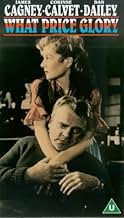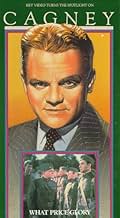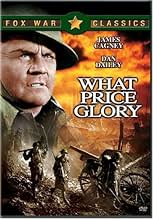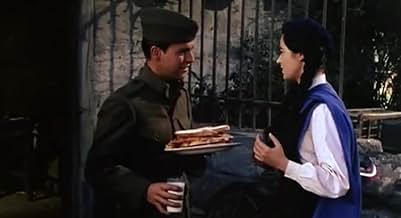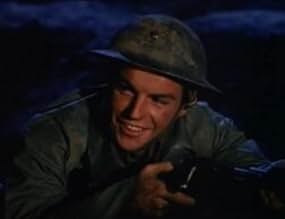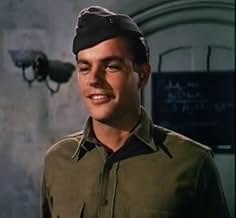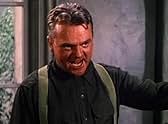NOTE IMDb
6,1/10
1,5 k
MA NOTE
Ajouter une intrigue dans votre langueThe wartime romantic misadventures of Captain Flagg, commander of a company of US Marines in 1918 France.The wartime romantic misadventures of Captain Flagg, commander of a company of US Marines in 1918 France.The wartime romantic misadventures of Captain Flagg, commander of a company of US Marines in 1918 France.
Max Showalter
- Lt. Moore
- (as Casey Adams)
Luis Alberni
- Grand Uncle
- (non crédité)
Olga Andre
- Sister Clothilde
- (non crédité)
Tina Blagoi
- Mrs. Bouchard
- (non crédité)
Danny Borzage
- Gilbert
- (non crédité)
George Bruggeman
- German Lieutenant
- (non crédité)
Frederic Brunn
- German Officer
- (non crédité)
Paul Bryar
- Charmaine's Uncle
- (non crédité)
Histoire
Le saviez-vous
- AnecdotesJohn Ford was an uncredited second unit director in the 1926 version directed by Raoul Walsh.
- GaffesCaptain Flagg's command was referred to as L Company, 5th Marines. In WWI Marine Companies were numbered. Prior to WWI they served independently with battalions and above were ad hoc organizations. 5th Marines should 5th Regiment. The change from Regiment to Marines wouldn't come until the 30s.
- Citations
Captain Flagg: It's a lousy war, kid... but it's the only one we've got.
- ConnexionsFeatured in Las Vegas, un couple (1970)
- Bandes originalesOui, Oui, Marie
(uncredited)
Music by Fred Fisher
Lyrics by Al Bryan and Joseph McCarthy
Sung by Corinne Calvet and chorus
Commentaire à la une
Well, despite having made "The Sands of Iwo Jima", John Ford made a movie about World War I Marines that doesn't really seem to be about Marines at all. I'm not a student of World War I Marine slang, but it seemed odd for Captain Flagg to pronounce Sergeant Quirt his "Top Soldier" and for Marines to refer to each other as soldiers. Despite the fact that they under French command, I found it odd for them to refer to being in the Army, since they are in the Corps. Go figure.
The two combat scenes are amateurish, even by Ford's standards. The acting is not convincing (except when Robert Wagner dies and Cagney manages not to over-act it) and while you can believe the two main characters don't like each other at the beginning, you never believe there's some odd tie binding them together. The character development is relatively tame, with only Wagner and Harry Morgan (Colonel Potter as a Marine Corporal and quartermaster!) showing any depth among the minor Marine characters.
Dan Dailey does play a convincing loud, parade ground senior NCO. He conveys the conniving and womanizing well, but when he is supposed to have finally fallen for the French beauty, it's hard to believe. Cagney plays merely a caricature of the hard-bitten, seen-it-all Marine. His final scene neither convinces you he considers staying or that the Corps means so much to him that he has to go.
The worst part is when a wounded Marine shouts out the title of the movie. It's something along the lines of "Are you going to get in the game, Captain? There's two minutes left and we need a hero. What price glory, Captain? What price glory?" One can imagine that delivered stirringly by a character whose motivation we understand, but instead, it is shouted by a nameless face with only a crazed look. It also would help if the Captain had been portrayed as a glory hound instead of drunken, war-weary yet sympathetic. I guess they had to get the name of the movie in somehow....
I was trying to imagine John Ford's World War I and was sadly disappointed that it wasn't more moving.
The two combat scenes are amateurish, even by Ford's standards. The acting is not convincing (except when Robert Wagner dies and Cagney manages not to over-act it) and while you can believe the two main characters don't like each other at the beginning, you never believe there's some odd tie binding them together. The character development is relatively tame, with only Wagner and Harry Morgan (Colonel Potter as a Marine Corporal and quartermaster!) showing any depth among the minor Marine characters.
Dan Dailey does play a convincing loud, parade ground senior NCO. He conveys the conniving and womanizing well, but when he is supposed to have finally fallen for the French beauty, it's hard to believe. Cagney plays merely a caricature of the hard-bitten, seen-it-all Marine. His final scene neither convinces you he considers staying or that the Corps means so much to him that he has to go.
The worst part is when a wounded Marine shouts out the title of the movie. It's something along the lines of "Are you going to get in the game, Captain? There's two minutes left and we need a hero. What price glory, Captain? What price glory?" One can imagine that delivered stirringly by a character whose motivation we understand, but instead, it is shouted by a nameless face with only a crazed look. It also would help if the Captain had been portrayed as a glory hound instead of drunken, war-weary yet sympathetic. I guess they had to get the name of the movie in somehow....
I was trying to imagine John Ford's World War I and was sadly disappointed that it wasn't more moving.
- navarre_dave
- 2 mars 2006
- Permalien
Meilleurs choix
Connectez-vous pour évaluer et suivre la liste de favoris afin de recevoir des recommandations personnalisées
- How long is What Price Glory?Alimenté par Alexa
Détails
- Date de sortie
- Pays d’origine
- Langues
- Aussi connu sous le nom de
- Au service de la gloire
- Lieux de tournage
- Marine Corps Base Camp Pendleton, Californie, États-Unis(army base scenes)
- Société de production
- Voir plus de crédits d'entreprise sur IMDbPro
- Durée1 heure 51 minutes
- Rapport de forme
- 1.37 : 1
Contribuer à cette page
Suggérer une modification ou ajouter du contenu manquant

Lacune principale
By what name was Deux durs à cuire (1952) officially released in India in English?
Répondre

